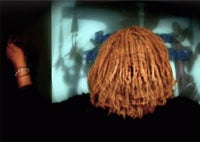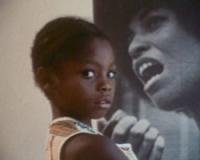Spirits of Rebellion was saturated with the rich history of several pioneers of the L.A. Rebellion period. As I watched, I was reminded of the origins of my own inspiration as a filmmaker. So many of the notable personalities reviewed by Spirits of Rebellion were filmmakers whose works I saw in my youth in the 1980s. Many young filmmakers like myself commented from the audience about having been influenced by either the community interactions of the ‘rebels’ or by the artistry of their craftsmanship as filmmakers.
This film, a work in progress, not only delved into the nuances of the New Black Cinema movement but also explored the movement’s particular relationships, mentors and obstacles. The relationships between the classmates—the camaraderie and the growing pains—seemed to all play a part in what became the L.A. Rebellion.

Davis’ collaboration with cinematographer Alan Rice also reinforces the notion that other races were involved in this progressive group. As Bernard Nicolas commented, this was a different time, when it was common for white people to critically explore the full spectrum of white privilege and race in general.
Also, there were several mentors who were former students at UCLA that continued to play an active role in the development of the filmmakers that followed them. This mentorship continues now, however, as an African American/Afro Caribbean student at UCLA in the 21st century, the mentorship seems not as accessible now as was then. Still, there is so much to learn about ourselves through the memories the members of this pioneering group recount in this documentary.
—Iyabo Kwayana
Among many important and poignant topics discussed by the filmmakers in director Zeinabu irene Davis’s work-in-progress documentary, Spirits of Rebellion, is that of the critical importance of public education in creating a perfect storm of culturally diverse filmmakers who defined an artistic movement. The group of minority students who became the L.A. Rebellion came together at UCLA at a time when public education was still fairly affordable. With little money and less interest in creating Hollywood-style movies, this group of guerilla filmmakers explored their own histories, found their toxic anger, their passion, their rituals and ultimately their voices. Had education been out of reach, this group may never have existed.
Today, public education is barely affordable. We study structure, we tap into our anger, we hone our voices and ultimately we hope to sell our work in the Hollywood marketplace. It seems little has changed.
However, as a screenwriting student at UCLA, I meet industry professionals, most of whom, so far, are female and minorities. I hear how the system works from the inside. I believe there has been a great paradigm shift since the Rebellion, but I wonder what will happen when public education is no longer affordable and my daughter has no place to turn to help discover her voice?
—Dawn Spinella






 Mobile Navigation
Mobile Navigation

